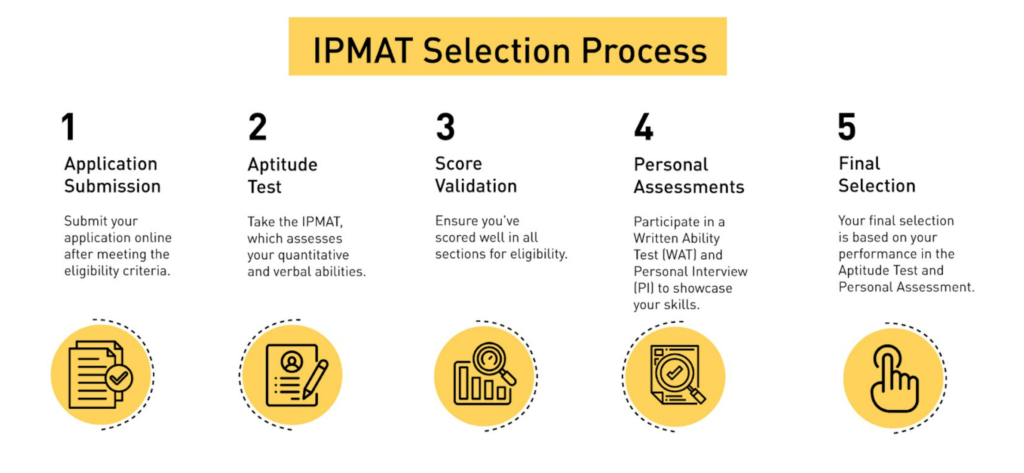EKYA/9 October 2024 Posted by : EKYA Schools
Guide to Conquer the IPMAT Entrance Exam
The Integrated Program in Management Aptitude Test (IPMAT) is a significant stepping stone for undergraduate aspirants aiming to carve a niche in the business management realm. Initiated by IIM Indore and now adopted by several other IIMs, IPMAT serves as a gateway for young students to enter prestigious management institutes directly after high school.
At Ekya Schools, we recognise the importance of early preparation for such competitive exams. We partnered with an esteemed institution like Career Launcher to provide our senior students with top-notch entrance exam coaching. This strategic collaboration ensures that our students are well-equipped not only to face the IPMAT but also to excel in it.
Understanding IPMAT and the Integrated Program in Management (IPM)
The Integrated Program in Management (IPM) serves as a prominent pathway into the Indian Institutes of Management (IIMs) for students immediately after completing their 12th grade. Originally pioneered by IIM Indore, this forward-thinking initiative has since been embraced by four additional IIMs—Rohtak, Ranchi, Bodh Gaya, and Jammu. The IPM merges a Bachelor’s Degree in Management with an MBA into a single five-year program, although it allows students the flexibility to exit after the first three years with just an undergraduate degree.
Given its wide-reaching appeal across various educational backgrounds and its high esteem within the professional community, management continues to be a top career choice for many aspiring students. The IPM’s inclusive, stream-neutral approach makes it an attractive option for those keen to delve into the world of management. To secure admission into these programs, aspiring candidates must successfully clear one of three entrance exams: IPMAT Indore, IPMAT Rohtak, or JIPMAT. Each of these exams is designed to meet the specific admission requirements of the respective IIMs.
At Ekya Schools, we believe in going beyond textbook learning to guide our students toward fulfilling careers that align with their passions and interests. Our College and Career Guidance provides a closer look at how we offer personalised guidance and strategic planning to help students navigate their future academic and career paths effectively.
IPMAT Eligibility Criteria - Gearing Up For Success
To be eligible for the IPMAT entrance test, you will need to meet specific age and academic qualifications requirements. The age limit is typically 20 years for the General and NC-OBC categories, with a relaxation of 5 years for SC/ST/PwD candidates. In terms of education, you must have passed your Class 10 and 12 board exams (or equivalent) in 2023, and 2024, or be appearing for them in 2025. While the minimum percentage requirement might be confirmed closer to the exam date, it’s wise to start preparing early in your senior school years to ensure you meet any potential benchmarks and have ample time to refine your skills for the IPMAT. By beginning early, you can develop a strong foundation in areas like quantitative and verbal abilities, giving you a competitive edge come exam day.
Exam Format and Syllabus
As we progress from discussing eligibility criteria, our focus shifts to the core components of the IPMAT: its exam format and syllabus. Mastery of these elements is crucial for developing an effective preparation plan and excelling in this rigorous test.
The IPMAT is structured as a computer-based test (CBT) and is divided into three key sections, which include:
| Section | Type | Focus Areas |
|---|---|---|
| Quantitative Ability (MCQs) | Multiple Choice Questions | * Arithmetic: Basic operations, percentages, averages, ratios & proportions * Algebra: Linear and quadratic equations, functions, inequalities * Geometry: Lines, angles, triangles, polygons, circles (area & perimeter) * Data Interpretation: Analysing data presented in tables, charts, and graphs |
| Verbal Ability (MCQs) | Multiple Choice Questions | * Reading Comprehension: Analysing and understanding written passages * Vocabulary Building: Recognising and using words effectively * Grammar & Usage: Identifying and correcting errors in sentence structure |
| Quantitative Ability (Short Answers) | Short Answer Questions | Focus on application and reasoning in areas similar to the MCQ section |
IPMAT Selection Process
Navigating through the IPMAT selection process is crucial for candidates aiming to secure a place in the Integrated Programme in Management (IPM). This multi-stage process not only tests your academic prowess but also your ability to perform under pressure and showcase your personality traits during interviews. Here’s a detailed walkthrough of the selection stages from the initial aptitude test to the final admission offer, emphasising the necessity of achieving high scores and excelling at the personal interview.
IPMAT Selection Process
IPMAT Selection Process Overview
The selection process for IPMAT typically involves the following steps:
Step 1: Online Application Submission
Candidates must first meet the basic eligibility criteria and then submit their applications through the institute’s official website.
Step 2: Aptitude Test
Eligible candidates are invited to take the IPMAT, which includes sections on Quantitative Ability and Verbal Ability to assess mathematical and language skills.
Step 3: Score Validation
Post-exam, an eligibility check is conducted to ensure candidates have scored positively in all sections of the test.
Step 4: Conducting Personal Assessments
Candidates who pass the eligibility check proceed to the Personal Assessment round, which may include a Written Ability Test (WAT) and a Personal Interview (PI). This stage evaluates the candidates’ communication skills, problem-solving abilities, and overall suitability for the program.
Step 5: Final Selection
The final step involves the creation of a merit list based on a Composite Score, which considers performances in both the Aptitude Test and the Personal Assessment.

Key Points to Note:
- The IPMAT Indore scores are accepted at various important institutions including IIM Ranchi, IIFT, and NALSAR University of Law.
- Candidates need to achieve positive raw scores and meet the minimum mark requirements in each of the three sections of the aptitude test to be considered for the personal interview stage.
- The final merit list is prepared based on the composite score, which considers the candidate’s performance across all stages of the selection process.
Preparation Strategies For IPMAT
Cracking the IPMAT is a challenge, but the rewards are immense. It’s the gateway to a prestigious management program, and the right preparation can make the difference between success and disappointment. This section lays out a roadmap for your journey, helping you attend the exam with confidence and achieve your goals.
- Understand the Exam Pattern and Syllabus
Begin by familiarising yourself with the detailed structure and syllabus of the IPMAT. Understanding the weightage of different sections and types of questions will help you allocate your study time effectively.
- Create a Structured Study Plan
Develop a comprehensive study plan that covers all topics systematically. Divide your time between learning new concepts, practising questions, and revising. Stick to your schedule diligently to ensure consistent progress.
- Focus on Fundamentals
Strong foundational knowledge, especially in quantitative and verbal sections, is crucial. Ensure you have a firm grasp of basic concepts before moving on to more complex problems.
- Practice Regularly
Consistent practice is key to success in IPMAT. Solve previous years’ question papers and take mock tests to familiarise yourself with the exam’s format and timing. This will also help identify your strengths and areas for improvement.
- Enhance Time Management Skills
Time management can make or break your exam performance. Practise completing sections within the allotted time to improve your speed and accuracy. Learn to prioritise questions based on your strengths.
- Work on Verbal and Written Communication
For the verbal ability section and any subsequent interviews or written tests, enhance your reading, speaking, and writing skills. Regular reading and practising essay writing can be very beneficial.
- Seek Guidance When Needed
If you find certain areas particularly challenging, consider seeking help from teachers, or mentors, or joining a coaching institute. Sometimes, external guidance can provide new perspectives and strategies that streamline your preparation.
- Stay Informed and Updated
Keep yourself updated with any changes in the exam pattern or dates and regularly check the official website for any announcements.
- Maintain Physical and Mental Health
Lastly, balanced preparation includes taking care of your physical and mental health. Regular exercise, proper nutrition, and adequate sleep will help you maintain peak performance during your preparation journey.
By following these strategies, candidates can approach the IPMAT with confidence and a clear plan, positioning themselves for the best possible outcome.
Successfully preparing for the IPMAT involves a structured approach, focusing on understanding the specifics of the exam, practising diligently, and maintaining a balanced lifestyle. When you go through this academic journey, remember that each component of your preparation—from mastering the basics to refining time management skills—plays a crucial role in shaping your performance. It is essential to assess and adapt your strategies regularly to ensure they meet your evolving needs. Also, do not underestimate the importance of physical and mental well-being; a healthy body and mind are just as critical as sharp intellectual abilities in achieving exam success. Stay committed, stay informed, and pursue your preparation with clarity and purpose. With determination and the right approach, you are well on your way to excelling in the IPMAT and advancing towards your educational and career goals.
